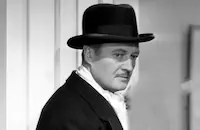Grand Exit

Brief Synopsis
Cast & Crew
Erle C. Kenton
Edmund Lowe
Ann Sothern
Onslow Stevens
Robert Middlemass
Wyrley Birch
Film Details
Technical Specs

Synopsis
Tom Fletcher may be an irresponsible ladies' man, but he is also the best fire investigator in the country. He is hired by the Interoceanic Fire Insurance Company to investigate a series of financially disastrous fires. Tom takes the job on the condition that he receive exorbitant perks and that his friend, John Grayson, be retained as the acting chief investigator. No sooner does Tom take the job than the Acme Fur company explodes into flames. As he investigates the scene, Tom meets Adrienne Martin, an attractive young woman who has been seen at numerous other fires. They are immediately attracted to one another, and John, also smitten by Adrienne, warns her that Tom is a Casanova. Tom discovers that all the fires were started by an arsonist disguised as a telephone repairman, and informs the insurance company of this. He then discovers that Adrienne has run a mysterious personal ad in the newspaper warning "F" not to use the phone again. At another fire, Tom discovers that the fire was set using a magnifying glass manufactured by the now-defunct Maxwell Company. Tom learns that the company went under when Interoceanic refused a loan to its owner, Erwin Maxwell, who swore revenge. Maxwell then committed suicide, though his body was never found. Tom searches Adrienne's apartment, and finds a passport in the name of Adeline Maxwell. He accuses her of being Maxwell's daughter, and has her confined to the mental ward of a hospital. Adrienne is sent a basket of fruit with the note "A--I got you into this and I'll get you out--F." Tom disguises himself as an orderly on the ward, where he witnesses a patient sneak into the paint room, which suddenly bursts into flames. Tom catches the arsonist, who turns out to be Erwin Maxwell. With the case solved, Tom fixes John up with Adrienne, who admits that she must be a little crazy, and tells Tom that he's a lucky man to have escaped her without being burned.

Director
Erle C. Kenton
Cast

Edmund Lowe

Ann Sothern

Onslow Stevens
Robert Middlemass
Wyrley Birch
Selmer Jackson
Guy Usher
Miki Morita
Arthur Rankin

Russell Hicks

Edward Van Sloan

Iris Adrian
Lois Lindsey
Dell Henderson
Raymond Brown
Sam Flint
Carol Tevis
Nora Cecil
George Lloyd
Edward Lesaint
William Worthington
Harry Stafford
Tom Francis
Daisy Belmore
Barlowe Borland
Lloyd Whitlock
Patricia Farley
Dorothy Dehn
Geneva Mitchell
Joseph De Stefani
Lee Prather
Dick Rush
Harold Howard
Monty Vandegrift

Lee Phelps
Stuart Holmes
Edward Earle
Ralph Mccullough
Arthur Stuart Hull
William Jeffrey

Jack Mower
Tom Ford
Jean De Briac
Louis Natheaux
Mickey Bennett
Frank Mills
Bill Nye
Earl M. Pingree
Monte Carter
Harry Dunkinson
Betty Farrington
Renee Whitney
Althea Henley
Earle Bunn
Ned Norton
John Ince
Alma Chester
Charles Dorety
Mike Lally
Frank Meredith
Edward Parker
Dick Allen
Dick Howard
Tom London
Jack Gray
Howard Chase
Ron Wilson

Ben Chapman
Don Roberts
Crew

Film Details
Technical Specs

Articles
Grand Exit

Grand Exit
TCM Remembers - Ann Sothern
TCM Remembers - Ann Sothern
Quotes
Trivia
Notes
According to information found in the MPAA/PCA Collection at the AMPAS Library, this story was first considered for developement at Paramount in 1934. When that studio submitted the original script to the PCA, it was rejected "because of the great emphasis throughout the story upon inceniarism." Paramount then presented written statements from the Traveler's Fire Insurance Co. and the Los Angeles Fire Department to the PCA, in an attempt to assure them that the proposed film would not demonstrate how to commit an arson fire, as "it is physically impossible to set fires in the manner we delineate." When Columbia took over the project in 1935, the PCA dropped its original objections, and showed concern only for language, alcohol usage and other minor details.














